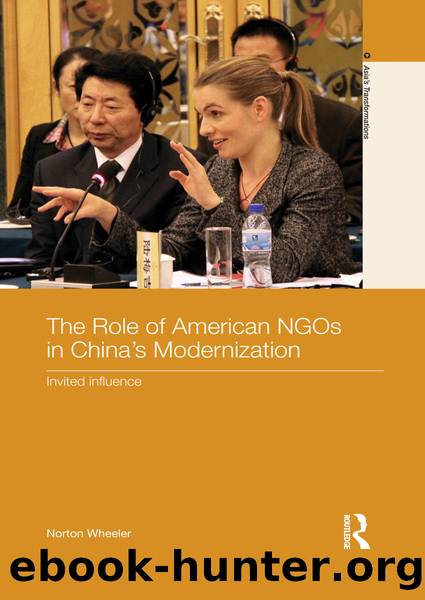The Role of American Ngos in China's Modernization: Invited Influence by Norton Wheeler

Author:Norton Wheeler [Wheeler, Norton]
Language: eng
Format: epub
Tags: Political Science, International Relations, General, American Government, World, Asian
ISBN: 9781138022751
Google: PFw0ngEACAAJ
Goodreads: 18816675
Publisher: Routledge
Published: 2012-08-01T00:00:00+00:00
Training civil society leaders at the Hopkins-Nanjing Center
While only six to seven percent of international or Chinese alumni go on to work for NGOs, those who do so have been visible beyond their numbers in the Centerâs semi-annual alumninewsletter, Centerpiece, and on the Alumni Update page of its website.101 In view of the expansion of civil society activity in and between the United States and China, these individualsâ influence within their respective societies and on the bilateral relationship may also be disproportionate to their numbers. A 2003 issue of the Hopkins-Nanjing alumninewsletter profiled eight international students, whose post-Center careers took them to such organizations as the USâChina Business Council, the Asia Foundation, and the Energy Foundationâs China Sustainable Energy Program in Beijing.102 And the National Committee has had Hopkins-Nanjing alumni (often two or three at a time) on its staff continuously since the turn of the century.103
A Chinese alumna (2000), after earning a masterâs degree, became one of the first program staff members at Junior Achievement China, then a staff writer at China Development Brief. From there, she went to rural Sichuan Province to work on public health programs with Partnerships for Community Development, a Hong Kong-based community development organization. These NGO experiences reinforced her sense of âthe positive changes that can be achieved if people partake in the public life of their society and take initiative on their own to solve public problems.â104 Another Chinese alumna (2001) also worked at Junior Achievement, which exposed her to the concept of an NGO. âDespite the fact that many Chinese do not yet fully appreciate the role of NGOs and volunteerism,â she said, âI believe the work I am doing will make a difference on the next generation and on Chinese society as a whole.â105
American alumnus Travis Tanner (2002) wanted âto involve myself in a professional role in the field of USâChina relations.â After completing the certificate program at the Center, he went on to earn an MA from SAIS and to become assistant director of Chinese Studies at the Nixon Center. Joseph Casey found that he could âhelp China to better develop while concurrently developing myselfâ by working for the poverty-relief NGO World Vision, first in Beijing and then in Yunan.106
The post-Hopkins-Nanjing Center career of Yang Xuedong, a 1994 Chinese alumnus, has been particularly interesting with respect to both Chinaâs modernization and USâChina relations. The Center influenced Yangâs intellectual development and his professional training. His course work, especially independent study with political scientist James Thompson, gave him a solid foundation in comparative politics. This experience prepared Yang to study for six months as a visiting scholar at Harvard in 1997 and for the 2001â2 academic year at Harvardâs Kennedy School of Government. It also helped prepare him to assume operational responsibility for an imaginative Ford Foundation-funded project.107
Since the resumption of relations between China and the United States, the Ford Foundationâs approach has been well matched with Chinaâs desire to obtain foreign technical assistance with minimal foreign control. The Foundationâs former country
Download
This site does not store any files on its server. We only index and link to content provided by other sites. Please contact the content providers to delete copyright contents if any and email us, we'll remove relevant links or contents immediately.
Spell It Out by David Crystal(35861)
Life for Me Ain't Been No Crystal Stair by Susan Sheehan(35550)
Cecilia; Or, Memoirs of an Heiress — Volume 1 by Fanny Burney(32094)
Cecilia; Or, Memoirs of an Heiress — Volume 3 by Fanny Burney(31482)
Cecilia; Or, Memoirs of an Heiress — Volume 2 by Fanny Burney(31436)
The Great Music City by Andrea Baker(30932)
Professional Troublemaker by Luvvie Ajayi Jones(29445)
We're Going to Need More Wine by Gabrielle Union(18664)
Twilight of the Idols With the Antichrist and Ecce Homo by Friedrich Nietzsche(18324)
The Secret History by Donna Tartt(18269)
All the Missing Girls by Megan Miranda(14859)
Cat's cradle by Kurt Vonnegut(14804)
Pimp by Iceberg Slim(13828)
Bombshells: Glamour Girls of a Lifetime by Sullivan Steve(13718)
Fifty Shades Freed by E L James(12937)
Talking to Strangers by Malcolm Gladwell(12916)
Norse Mythology by Gaiman Neil(12880)
The Social Justice Warrior Handbook by Lisa De Pasquale(11970)
Underground: A Human History of the Worlds Beneath Our Feet by Will Hunt(11857)
